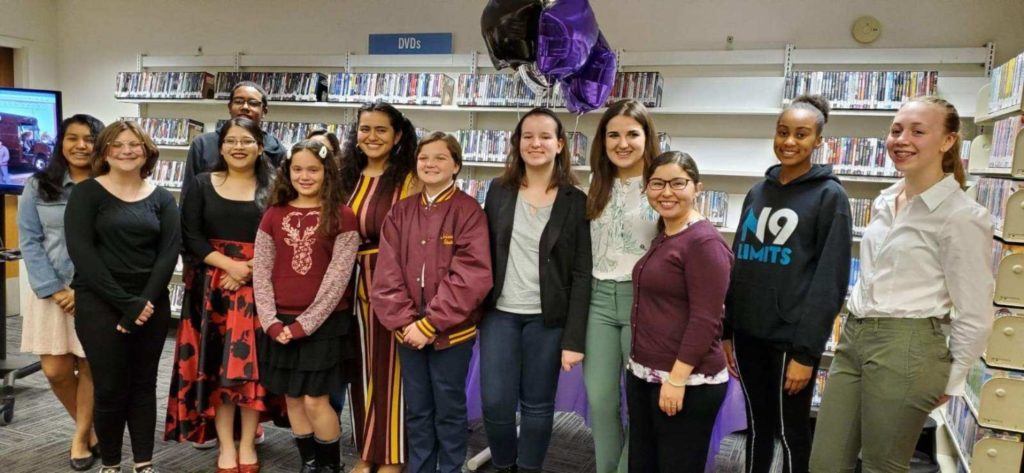
By Michelle Hirsch
A jury of one’s peers takes on significant results in the award-winning Guadalupe Teen Court program, where teen defendants agree to face a courtroom of their peers who will hear their case and decide consequences for their crime.
The teen court program recently celebrated a milestone 5-year anniversary with a gratitude celebration event that included community leaders, elected officials and industry professionals, along with teen court volunteer members and their families.
U.S. Congressman Ruben Gallego presented the court with a Special Certificate of Congressional Recognition in observance of what was termed outstanding and invaluable service to the community.
One of the many successes that makes the court program outstanding, say officials, is the impressive commitment of the teen volunteers who meet each week, year-round, to learn the law and court procedures, consult with community leaders and other professionals, participate in lessons and activities to increase their knowledge and leadership skills, and serve in teen court positions to adjudicate cases.
Court members are youth ages 12-18 who volunteer their time after school to participate in weekly meetings and serve as jurors, attorneys, victim advocates, bailiffs and judge/forepersons to adjudicate actual cases of teen offenders who’ve committed crimes such as shoplifting, assault, trespassing, vandalism and other offenses.
Cases are referred from the Maricopa County Superior Court, Juvenile Division, for teen offenders from Tempe, Chandler, Guadalupe and Phoenix.
The non-profit program, which is based at Guadalupe Town Library, is not affiliated with a specific school or district. Therefore, teen members come from different local high schools including Corona del Sol, Marcos de Niza, Desert Vista, Mountain Pointe, ASU Preparatory Academy, Tempe Preparatory Academy and Aprende Middle School.
Teen court members work together to conduct court proceedings by first questioning a teen defendant, then deliberating while considering the aggravating and mitigating circumstances of each case to decide consequences for those brought before them.
The goal, say officials, is to implement restorative justice, a concept designed to repair the victim and the community, and to educate the offender.
Research shows teen courts significantly reduce recidivism compared to traditional juvenile court systems.
“I feel [Guadalupe Teen Court] makes a positive difference all around,” said Teen Court member Marisa Guisto, a sophomore at ASU Preparatory Academy. “I get education about the legal system that I may need to be a successful adult; the teen offenders are able to look back and realize the mistakes they made; and society benefits as a whole because most of these people do not become repeat offenders.”
Consequences assigned to teen offenders vary with each case but can include community service hours, teen court jury duty, educational classes that teach coping skills, positive decision-making, ways to deal with peer pressure or drug and alcohol issues, building healthy relationships, or tutoring to help offenders improve grades.
Writing an essay or apology letter can provide additional consequences for teen offenders to help them take responsibility for their offense and better understand the ways their crime affects others.
Probation officers oversee teen offender cases to ensure they satisfy their assigned consequences within two months.
“Guadalupe Teen Court means so much more than just restorative justice, although that is our key role. It means building connections and helping others who have committed a
mistake understand the consequences that affect not only them but their community and family,” said Michelle Valdez, a four-year member of the court and a senior at Marcos de Niza High School.
“I love giving people second chances because no one is perfect and we all make mistakes,” added Violeta Panayotova, a junior at Tempe Preparatory Academy.
“Instead of giving teens a criminal record that will follow them forever and prevent them from getting some jobs, Guadalupe Teen Court is helping them continue their life but also take responsibility for their actions and learn a valuable lesson.”
While teen court members’ dedicated participation makes the program successful for young offenders, the teen volunteers share views that they and the community benefit, too.
Amanda Guisto, a seventh grader at Aprende Middle School said:
“I feel that Guadalupe Teen Court has made me more confident to speak up and say what I feel about a situation because I was very nervous the first case, but as I saw how it works, it made me more confident to say something.
“It’s fun to learn about the law and more about the judicial system, but I also really love the friends I’ve made and that I’m able to help teens who committed a crime.
“In Guadalupe Teen Court, I am surrounded by people with goals and determination. All of us make an effort to help other teens while building a connection together through our passion for the judicial system.”
Interested teens are welcome to inquire about the the program on Instagram or Facebook, or email guteencourt@gmail.com.


